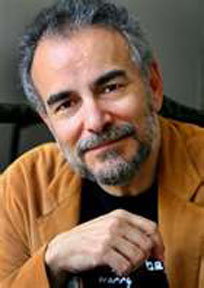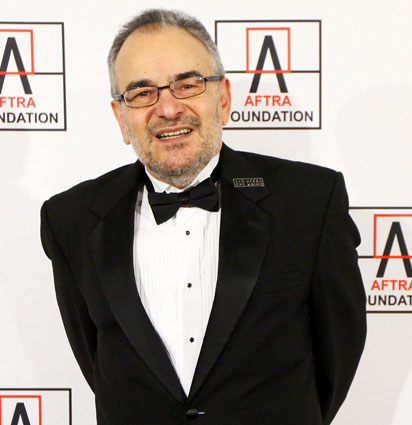Update — Saturday, April. 28, 2012 — Bill Diehl (WNEW/ABC) spoke with Pete Fornatale a couple of years ago on ABC radio, after Fornatale released his ode to the Woodstock era entitled “Back to the Garden: The Story of Woodstock.” http://www.youtube.com/watch?v=1FQSS1UNuJg
New York Times feature story by Douglas Martin, published: April 27, 2012, appears below the following item.
Pete Fornatale, pioneering NYC rock radio deejay and writer, dead at 66
Bronx native was one of first free-form deejays on early FM rock radio
By David Hinkley – NEW YORK DAILY NEWS
Thursday, April 26, 2012, 4:07 PM
Pete Fornatelle, a New York deejay, historian and writer who for almost 50 years championed the spirit of musical freedom on the radio airwaves, died  Thursday at Beth Israel Medical Center. He was 66.
Thursday at Beth Israel Medical Center. He was 66.
He suffered a brain hemorrhage on April 15 and been in intensive care for the last week.
A native of the Bronx and a graduate of Fordham, Fornatale started his deejay career Nov. 21, 1964, hosting “Campus Caravan” on Fordham’s WFUV.
He continued “Campus Caravan” until 1970, by which time he was also working at WNEW-FM as one of the pioneer free-form deejays on early FM rock radio.
“For the first time, we could play music on the radio the way we played it in our lives,” he said last year. “It wasn’t just the top 40 played over and over. You could play longer tracks, you could play older tracks, you could make the music fit together.
“It was magical.”
“My fondest memory of Pete,” said his long-time radio colleague Pat St. John, “was listening to him one Sunday morning when he was doing a show on different songs about life.
“A particular favorite of mine is a very little-known song by Rick Nelson simply called ‘Life.’ After about an hour, I called Pete and suggested this tune, and he told me he’d just cued it up and it’d be the next song he was going to play.
“It goes, ‘Life, what are we here for? / I want to know more.’”
Fornatale worked at WNEW-FM until 1989, when he moved to WXRK. He briefly moved back to WNEW-FM a few years later.
But as commercial radio moved further away from the free-form spirit, he and other free-form advocates became increasingly disenchanted.
In 2001, he returned to non-commercial WFUV, where he hosted a free-form show he had started in 1982 called “Mixed Bag.” He also hosted a weekly in-depth interview show, and he frequently tied both shows to historic or contemporary themes.
His last “Mixed Bag” show on April 14, commemorated the 100th anniversary of the sinking of the Titanic.
“This is just the right amount of radio to be doing,” he said last year. “I have this show every week where I can say what I want, but I don’t have to be scrambling to fill four hours every day. That gets harder as you get older.”
He developed close relationships with artists like Paul Simon over the years and was also active in several charity organizations.
That included World Hunger Year, which was co-founded by his friend Harry Chapin in 1975 and is now run by cofounder Bill Ayres as WhyHunger.
Fornatale raised money and hosted WHY events for many years.
He also wrote a number of books on music, including a history of Woodstock and a biography of Simon and Garfunkel. He often hosted shows on WNET and was a consultant on music projects for MTV and VH1.
He said last year he was always fascinated by “the real stories of what happened with music and songs. So much gets mythologized, but to me the real story is almost always better.”

Pete Fornatale attends the AFTRA Foundation’s 2012 AFTRA Media and Entertainment Excellence Awards in February. Neilson Barnard/Getty Images
He won the Armstrong Excellence in Broadcasting Award in 1983 and received AFTRA’s Media and Entertainment Excellence Award in February at the Plaza.
Fornatale was born and raised in the Belmont section of the Bronx, known as Little Italy.
He was just a few years behind Dion and the Belmonts, who were one of his favorite artists, and he recalled growing up to the sound of vocal harmony groups, as well as Elvis and early rockers.
The first record he bought, he said, was Elvis’s “Hound Dog.”
He graduated from Fordham Prep before he attended Fordham, and after he graduated he spent two years as a teacher before going into radio full-time.
“Pete was always teaching us,” said folksinger and friend Christine Lavin, “even when we thought we were just being entertained.”
Fornatale is survived by his ex-wife Susan and their three sons, Peter, Mark and Steven.
Click on link for New York Daily News http://www.nydailynews.com/topics/Pete%20Fornatale
Pete Fornatale thumbnail photo and WNEW-FM promotion publication added by WNEW1130.com
NEW YORK TIMES FEATURE STORY By DOUGLAS MARTIN
Published: April 27, 2012
Pete Fornatale, a disc jockey who helped usher in a musical alternative to Top 40 AM radio in New York in the late 1960s and early 1970s, presenting progressive rock and long album tracks that AM stations wouldn’t touch and helping to give WNEW a major presence on the still-young FM dial, died on Thursday in Manhattan. He was 66. The cause was complications of a stroke, his son Mark said.
Pete Fornatale in 2002 at WFUV at Fordham University, where he first hosted a radio program as a sophomore there.Photo by Ting-Li Wang/The New York Times
FM radio had been around for a while but did not come of age until the 1960s, when, amid the whirlwind of a growing counterculture, the federal government mandated that FM stations carry different programming from that of their sister AM bands. Enterprising D.J.’s grasped the chance to play longer, fresher, rarer music and give voice to the roiling political and social issues of the day.
Mr. Fornatale was at the forefront of the FM revolution, along with WNEW-FM colleagues like Scott Muni, Rosko, Vin Scelsa, Dennis Elsas, Jonathan Schwartz and Alison Steele (who called herself “the Nightbird”). They played long versions of songs, and sometimes entire albums, and talked to their audiences in a conversational tone very different from the hard-sell approach of their AM counterparts.
WNEW-FM may have been the most influential experimenter. When the station dropped rock music for talk radio in 1999, Billboard called it “a legend, affecting and inspiring people throughout the industry.”
Mr. Fornatale (pronounced forn-a-TELL) had actually beaten WNEW to the punch. As a sophomore at Fordham University in 1964, he persuaded the school’s Jesuit leaders to let him do a free-form rock show on what was officially an educational station. He continued that show for a few years after he graduated, and for a while could be heard on both WFUV and WNEW.
WOR-FM became the first commercial station in New York to adopt the format, in 1966, but abandoned it after about a year. WNEW, with the slogan “Where Rock Lives,” adopted it in 1967.
Mr. Fornatale came on board in 1969 and quickly moved to the center of New York’s music scene. He gave early exposure to country-rock bands like Buffalo Springfield and Poco. He did one of the first American interviews with Elton John, and got a rousing ovation when he brought a rented surfboard to Carnegie Hall for a Beach Boys show. He introduced Curtis Mayfield to Bob Dylan at a Muhammad Ali fight.
In 1982 he started “Mixed Bag,” a program that emphasized singer-songwriters, on Sunday mornings. His regular guests included Suzanne Vega, who introduced herself to him by sending a fan letter.
One of Mr. Fornatale’s signatures was playing songs that followed a theme. It might be colors, with a playlist including the Beatles’ “Yellow Submarine” and Joni Mitchell’s “Blue.” Or it might be great inventions, as when he celebrated the 214th anniversary of the United States Patent Office. Or the theme might simply be radio.
Peter Fornatale was born in the Bronx on Aug. 23, 1945, and graduated from Fordham Preparatory School, on the campus of Fordham University. His introduction to rock ’n’ roll came in 1956 when his father summoned him to the television to see “this crazy guy” — Elvis Presley. The first record he bought was Presley’s “Hound Dog.”
Mr. Fornatale graduated from Fordham with a degree in communications in 1967 and taught English at a Roman Catholic high school before joining WNEW. His voice drew praise for its mellow, almost professorial tone, although some listeners may have chosen to describe it as nasal.
By the early 1980s, stations specializing in what had been known as free-form radio were bringing in business consultants who urged less variety in records and more control over the disc jockeys. Mr. Fornatale later complained that he and his colleagues had been demoted from chefs into waiters, “and fast-food waiters at that,” as he told The Record of Bergen County, N.J., in 1999.
He left WNEW in 1989 to follow the station’s program director to WXRK-FM (K-Rock), which followed a more conventional approach to pop music. Mr. Fornatale’s show came on after Howard Stern’s. Mr. Stern, whose shock-jock format was becoming radio’s new wave, called Mr. Fornatale the “anti-Stern.”
In 1997 Mr. Fornatale returned to WNEW-FM, which had decided to go back to album-oriented rock after a succession of owners and formats. But within a year the station had changed formats again, to talk. In 2001, Mr. Fornatale returned to where he had started: WFUV. “I love the idea I’ve come full circle,” he said.
Mr. Fornatale wrote several books, including one on the making of Simon and Garfunkel’s 1968 album “Bookends,” and one on the Woodstock music festival. He was also the main writer for a series of 600 trading cards on the life of Elvis Presley.
He had lived for six years in Rockaway, Queens, and the previous four decades in Port Washington, N.Y.
Mr. Fornatale’s marriage to Susan Kay Flynn ended in divorce several years ago. He is survived by his sons, Peter, Mark and Steven, and his brother, Robert.
His WFUV show, which like his earlier WNEW singer-songwriter show was called “Mixed Bag,” ran from 4 to 8 p.m. on Saturdays.
“If you give me the right idea for a program,” Mr. Fornatale said in 2004, “I can give back to you a three-hour journey where, if you tune in at any time, you’re likely to hear something that will entertain you. But if you take the ride with me, when we get to the end, you’ll say, ‘Wow, what a long, strange trip it’s been.’ ”
 Thursday at Beth Israel Medical Center. He was 66.
Thursday at Beth Israel Medical Center. He was 66.
